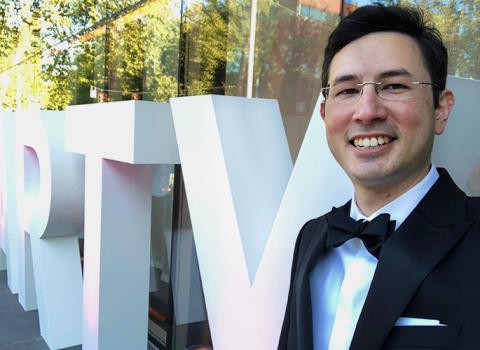Lokela Alexander Minami
Community Engagement Manager, Seattle Opera
UW Majors: Germanics and Political Science
Tell us a bit about your job (e.g. what kinds of things you’re working on, what types of problems you solve day to day, etc.)?
Each day is unlike the next in my position. My responsibilities include overseeing Seattle Opera’s audience enrichment programs, which help to contextualize the works we present and deepen the audience’s relationship with the art form. Depending on what’s on stage, that work might include anything from giving talks and lectures or interviewing artists or members of a production’s creative team. I also design and deliver online classes and organize panel discussions. Throughout the process, I work with a range of specialists like website managers, graphic designers, video editors, or production crew members in order to deliver a final product, and I coordinate closely with my colleagues in the Artistic, Marketing, Development, and Production Departments.
One of the special joys of my work in audience education is that I get to work closely with our Scholar in Residence, Prof. Naomi André, to dig into these works and explore how social issues and themes within them continue to speak to us today. In addition to all of this, I also maintain our community partnerships, like our ongoing collaborations with Path with Art and the Northwest African American Museum, as well as any number of other collaborations in which a community organization might see a meaningful connection point with opera in their events or programs. Lastly, an important and rewarding part of what I do is to participate in our work on racial equity, which at the moment involves a systematic review of our programs to ensure that they are rooted in equity. My work is not all glamour, however. Underpinning all of the fun work is an awful lot of tedium, like scheduling, contracting, time sheets and payroll, budgeting, and copyediting, but that’s what makes the world go around.
How do you think your humanities education has influenced/advanced your career path?
So much my work depends on communication and collaboration, and a background in the humanities has been invaluable for this kind of work. It has not only exposed me to a breadth of ideas and information, which has allowed me to communicate more effectively with a variety of stakeholders, like community partners or interdepartmental colleagues, but more importantly, it has made me more mindful of the possibility that there might be perspectives that are different from—and equally as valid as—my own. I’ve benefited throughout my career by my openness to hearing others’ ideas and thereby recognizing solutions or possibilities that I wouldn’t have been able to come up with on my own.
On that point, while there are many career paths in which one might be able to derive a solution from an algorithm, in arts or non-profit administration, we more often have to navigate a world of nuance and complexity and imperfect data and competing value systems. The humanities prepared me for this kind of work environment by honing the critical thinking and analytical reasoning skills to create and communicate meaning out of the chaotic jumble of our existence. I am presented each day—more so now than ever—with a new set of challenges and assignments and must somehow chart a course forward. My humanities education has equipped me with the skills needed to work effectively with my colleagues, build connections with community partners, and together find creative solutions to these challenges so that we may continue to broaden access to the arts and offer meaningful engagement to our audiences.
Want to read more? Check out the profiles on the Alumni Spotlights page for more information on what our humanities majors are up to.
